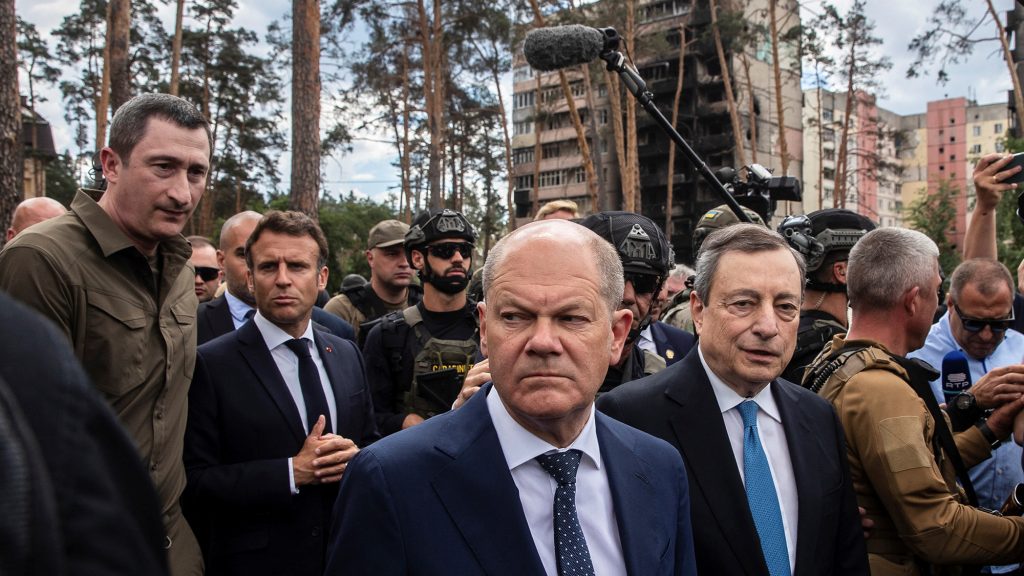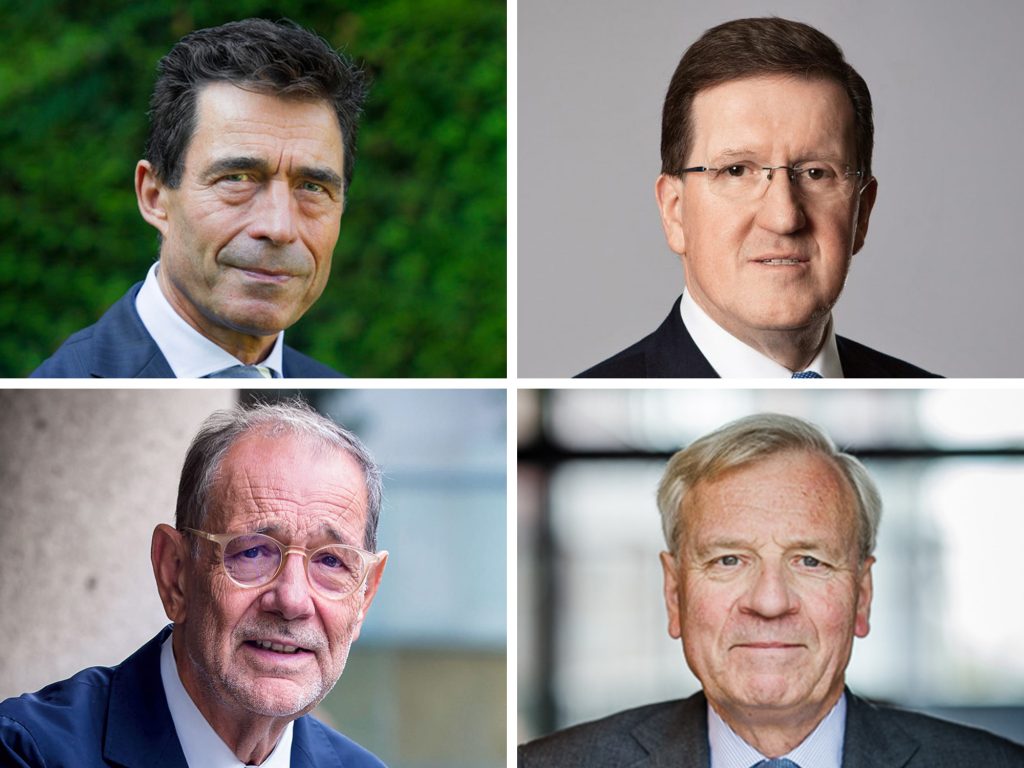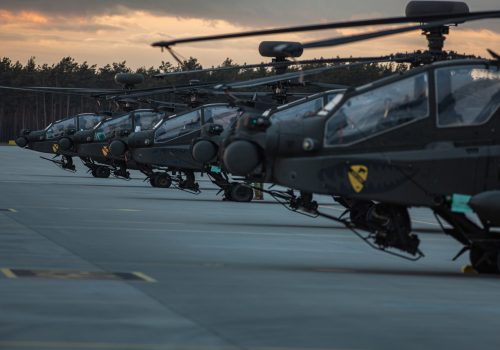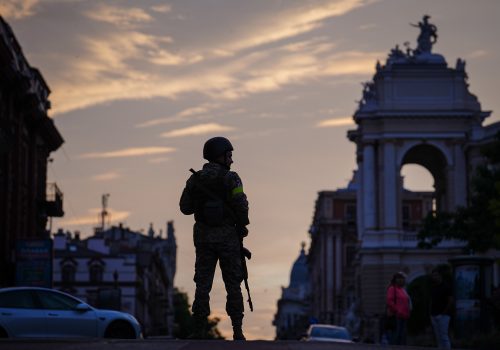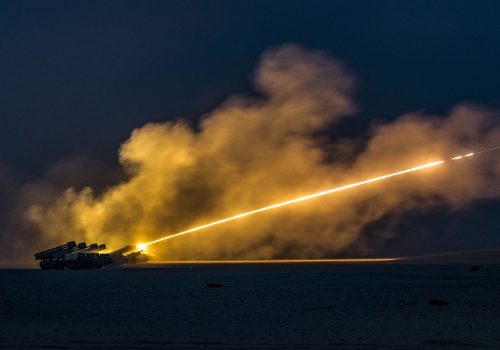Watch the full event
NATO should have a few objectives for its summit in Madrid later this month, said former NATO Secretary General George Robertson: “weapons, weapons, weapons—and a free, democratic Ukraine.”
Robertson joined three other former NATO chiefs—Anders Fogh Rasmussen, Jaap de Hoop Scheffer, and Javier Solana—at an Atlantic Council Front Page event on Wednesday where the group discussed NATO’s response to the war, enlargement, and the next plays in Alliance’s playbook.
Also at top of mind for the summit, said de Hoop Scheffer: Alliance members showing that they “are in full political agreement on what we should achieve in Ukraine.”
That kind of solidarity, Rasmussen said, will convey to Russian President Vladimir Putin that the way “out of [this] mess” is “out of Ukraine.” He also wants NATO to agree to establish bases in Eastern Europe—in Baltic countries, Poland, and possibly Romania—”to strengthen our territorial defense.”
The former secretaries general stressed the importance of keeping the war as a top public concern—as its economic consequences such as inflation continue to bite. Solana said maintaining public awareness will make sure that “the tension in the international community… against Putin does not decrease.”
Here are other top highlights from the event, moderated by Fox News National Security Correspondent Jennifer Griffin.
Has NATO done enough?
- “NATO allies should do much more to provide aid to the Ukrainians,” Rasmussen said, including long-rage artillery and other heavy weaponry Ukraine has requested. And the arms that NATO is sending, Robertson noted, are sometimes facing delays. There’s a “logistical nightmare” involved in getting weapons to a country at war, he explained. “We can’t pretend that it is easy to do the reinforcement that is necessary.”
- Solana agreed, explaining that Ukraine’s short border with Poland doesn’t offer many points of entry in Ukraine. But, he said, NATO has still “done a lot” for Ukraine and has “helped there as much as we can.”
- In addition, NATO should train Ukrainians in how to use the “sophisticated weaponry” the Alliance is sending, said Robertson. “It’s a citizens’ army by and large,” fighting this war, and “supplementing their professional army—and training… we can do well.”
- In addition to sending arms, de Hoop Scheffer said NATO leaders need to show up politically for Ukraine. Recent comments from some leaders, explained de Hoop Scheffer without naming names, give “the impression that they’re not always [singing] from the same hymn sheet.”
Getting it right—and wrong—on enlargement
- Finland and Sweden are “very likely” to join NATO soon, said Solana. Robertson explained that “they bring a lot militarily” to the Alliance, with Finland bringing “a very sophisticated all-of-nation concept of resilience” developed while protecting its border from neighboring Russia. Solana agreed, saying that by the time Finland joins NATO, it’ll likely be the country “best prepared… vis-à-vis defending its border.”
- Robertson recalled having spent his four-year term at NATO “trying to persuade Sweden and Finland to join… Putin managed that in four weeks.” Their membership, Robertson said, would mark a “huge step forward” in foiling Putin’s goals to divide the Alliance and stop NATO enlargement.
- Turkey’s threat to block Swedish and Finnish membership “will require an element of bargaining,” Robertson said, adding that NATO will need to “listen to what [Turkey says].” But, he said, “no one nation should be able to put a block” on an application for membership, especially of two countries that “are so obviously going to add to NATO’s strength.”
- The secretaries general also looked back to when NATO told Ukraine and Georgia that they would become members of NATO—while denying them a customary Membership Action Plan in 2008. “It was a big mistake,” Rasmussen said, as it angered Putin and sent him a signal that NATO was weak, helping to pave the way for the Russian leader’s aggression toward Georgia in 2008 and Ukraine in 2014. “Now we are paying the price,” said Rasmussen.
- But Robertson said Putin’s saber-rattling over NATO expansion now is “completely bogus” given that he never objected to enlargement during nine meetings with Robertson in the early 2000s—when Putin even inquired about Russia joining the Alliance. “Rewriting history appears to be now part of his mission, but that bit of history I can vouch for,” Robertson said.
In the transatlantic playbook
- Russia’s claim that it destroyed a NATO weapons warehouse in Ukraine shows that NATO has “underestimated the brutality and ambitions of Putin,” Rasmussen said. But while NATO mulls a response, it “should never, ever give into the threats or warning shots… from Putin,” Rasmussen said.
- Robertson stressed that the Alliance shouldn’t specify its intended response in advance of any possible moves from Putin against NATO; “ambiguity is the very basis of deterrence,” he explained. “[Putin] needs to know there would be consequences and they will be huge.”
- On Putin’s nuclear threat, de Hoop Scheffer said that he thinks the Russian leader is “bluffing” and “he will realize that if he… puts one toe onto NATO territory, he’s in big, big, big trouble.”
- Another important play, according to de Hoop Scheffer, is for allies to cooperate more on targeting Russian oil. While the European Union recently agreed to ban 90 percent of Russian crude oil by the end of the year, Rasmussen said there should be a “complete stop” in purchasing Russian gas because it helps finance the war machine. “Those who are opposed to [stopping] pouring money into Putin’s coffers are de facto complicit in his war crimes,” said Rasmussen.
Katherine Walla is an assistant director of editorial at the Atlantic Council.
Watch the full event
Further reading
Wed, Mar 9, 2022
Defending every inch of NATO territory: Force posture options for strengthening deterrence in Europe
Issue Brief By
Deterrence in Europe can be enhanced through a range of US and NATO force posture enhancements.
Tue, Jun 14, 2022
The future of global security will be decided in Ukraine
UkraineAlert By
Western leaders must use the forthcoming NATO Summit in Madrid to regain the initiative from Putin's Russia and define Ukraine's role in the future of European security, writes Ukrainian Defense Minister Oleksii Reznikov.
Thu, Jun 9, 2022
Russia Crisis Military Assessment: The impact of multiple rocket launcher transfers to Ukraine
New Atlanticist By
To help Ukraine expel Russian forces from its territory, the United States must begin its full transition to US-made equipment now, write our military fellows. Here's what that means.
Image: Ukrainian Minister for Communities and Territories Development Oleksiy Chernyshov walks next to French President Emmanuel Macron, German Chancellor Olaf Scholz, Italian Prime Minister Mario Draghi and Romanian President Klaus Iohannis during their visit, as Russia's attack on Ukraine continues, in Kyiv, Ukraine June 16, 2022. Photo via REUTERS/Viacheslav Ratynskyi.
